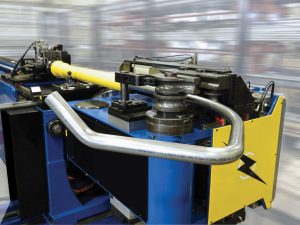Manufacturing procurement delays in projects often stem from psychological factors that drive decision-makers to postpone critical sourcing decisions until project pressures force suboptimal choices. When managers delay commitments for essential material processing or specialized CNC tube bending services in Detroit, it creates cascading problems that affect quality, costs, and delivery schedules throughout the entire manufacturing process.
Knowledge of these psychological patterns helps project managers develop procurement strategies that avoid common decision-making traps and protect project success. Our CNC machining capabilities support efficient project execution through streamlined procurement processes and predictable delivery schedules.
Analysis Paralysis in Vendor Selection
Project managers often delay vendor selection decisions when faced with multiple fabrication options that appear similar on surface evaluation. This analysis paralysis is common when evaluating specialized requirements like CNC tube bending services in Detroit, where the technical differences between suppliers may not be immediately apparent.
Information overload contributes to procurement delays when managers attempt to evaluate every possible fabrication option and supplier capability. The abundance of technical specifications for material processing, pricing variables, and quality claims creates cognitive burden that promotes decision avoidance rather than systematic evaluation.
Perfectionism in vendor selection leads to extended evaluation periods that consume valuable project time. Managers may continue searching for ideal suppliers rather than selecting qualified vendors who meet project requirements. This perfectionist approach often results in rushed decisions when project deadlines create time pressure.
Fear of making wrong supplier choices creates psychological resistance to committing to fabrication partners. Previous negative experiences with vendors amplify this fear and promote excessive caution in selection processes. This risk aversion leads to prolonged evaluation periods that delay project initiation.
Decision committee dynamics complicate vendor selection when multiple stakeholders require consensus approval. Different evaluation criteria among committee members create disagreements that extend decision timelines. These group decision challenges often result in compromise selections that satisfy no one completely.
Budget Approval Procrastination
Procurement managers often delay budget approval requests when fabrication costs, eincluding specialized media blasting services in Detroit, exceed initial estimates or internal expectations. This delay stems from reluctance to communicate cost increases to management and fear of budget rejection or project cancellation.
Sticker shock from precision fabrication and assembly services in Detroit quotes creates psychological resistance to approving expenditures that seem disproportionate to material costs. Managers unfamiliar with fabrication processes may not appreciate the labor and equipment costs required for quality work. This cost surprise leads to extended internal discussions and approval delays.
Capital budget cycles create artificial delays when procurement requests coincide with budget review periods or fiscal year transitions. These timing issues force project delays even when funding is available and fabrication requirements are clearly defined.
Risk tolerance variations between management levels create approval bottlenecks when senior executives require additional justification for fabrication expenditures. Conservative financial management approaches may demand multiple cost estimates and extended evaluation periods before approving purchases.
Previous budget overruns create institutional caution that extends approval processes for subsequent projects. Organizations that have experienced cost surprises implement additional review layers that slow procurement decisions and extend project timelines unnecessarily.
Learn more about efficient procurement strategies in our comprehensive guide to how AI will affect CNC machining and intelligent manufacturing solutions.

Specification Perfectionism Syndrome
Engineering teams often delay fabrication procurement while attempting to perfect technical specifications for CNC tube bending services in Detroit may have minimal impact on final component performance. This perfectionism creates extended design review cycles that consume project schedule time without proportional value creation.
Over-specification tendencies lead to unnecessary precision requirements that increase fabrication costs and extend delivery timelines. Engineers may specify tighter tolerances or superior materials than functional requirements actually demand. These excessive specifications create procurement delays and budget overruns.
Continuous specification refinement prevents procurement initiation when engineering teams make incremental improvements without considering cumulative delay impacts. Each design modification requires vendor re-quotation and approval cycles that extend project timelines significantly.
Cross-functional coordination delays occur when specifications require input from multiple engineering disciplines or departments. These coordination requirements create interdependencies that slow specification finalization and prevent procurement advancement.
Change order fear drives specification perfectionism when teams attempt to anticipate all possible design variations before procurement initiation. This anticipatory approach often creates delays that exceed the cost and schedule impact of potential change orders.
Competitive Bidding Overdependence
Procurement policies that mandate multiple competitive bids create systematic manufacturing procurement delays that may not provide proportional value for straightforward fabrication projects. These policies assume that competition always produces better outcomes, ignoring time value and relationship benefits.
Bid evaluation complexity increases with the number of competing proposals for CNC tube bending services in Detroit, creating extended analysis periods that delay supplier selection. Comparing diverse fabrication approaches and pricing structures requires significant technical expertise and evaluation time.
Lowest bid selection pressures create quality risks that lead to extended evaluation processes to verify supplier capabilities in material processing in Detroit. These verification activities delay decisions and may not eliminate quality risks effectively.
Vendor qualification procedures required for competitive bidding add administrative time and complexity to procurement processes. New supplier evaluation requires facility audits, capability verification, and reference checking that extends selection timelines.
Bid protest potential creates conservative procurement approaches that emphasize defensive decision-making over project efficiency. Procurement managers may choose slower processes that minimize challenge risk rather than optimizing project success.
Relationship Dependency Hesitation
Procurement managers may delay supplier selection decisions when considering departure from established vendor relationships. This hesitation stems from uncertainty about new supplier capabilities in assembly services in Detroit and concern about disrupting functional business relationships.
Single-source dependency fears create reluctance to commit fully to new fabrication partners, even when current suppliers lack required CNC tube bending services in Detroit. This dependency concern leads to dual sourcing attempts that complicate procurement and increase coordination overhead.
Vendor relationship management complexity increases when projects require capabilities beyond current supplier portfolios. Developing new supplier relationships requires time investment and relationship building that many managers prefer to avoid.
Geographic considerations affect supplier selection when local vendors lack required capabilities compared to distant suppliers with superior technical qualifications. These location trade-offs create decision complexity that promotes procrastination.
Contract negotiation complexity with new suppliers creates additional decision delays when terms differ significantly from established agreements. Legal review requirements and relationship establishment procedures extend procurement timelines substantially.
For detailed information on supplier relationship management, explore our insights on CNC milling expertise across sectors.

Timeline Pressure Paradox
Project managers often delay procurement decisions early in project schedules when time pressure feels minimal, not recognizing that these early manufacturing procurement delays create severe time pressure later in project execution. This timeline mismanagement creates a paradox where early delays cause later crisis management.
Optimism bias leads managers to underestimate fabrication lead times and assume that procurement can be accelerated when schedule pressure emerges. This optimistic planning creates unrealistic expectations and forces suboptimal supplier selections under time pressure.
Priority shifting occurs when other project activities seem more urgent than procurement planning for assembly services in Detroit, leading to delayed supplier engagement. This priority misalignment ignores the critical path impact of fabrication lead times on overall project schedules.
Crisis management becomes necessary when procurement delays compress fabrication schedules to unrealistic timelines. These crisis situations force expedited processing that increases costs and reduces quality control time.
Schedule compression attempts through expedited fabrication create quality risks and cost increases that often exceed the value of accelerated delivery. These forced acceleration efforts rarely achieve desired schedule recovery without significant trade-offs.
Quality Versus Cost Decision Paralysis
Procurement decisions become complex when quality requirements conflict with budget constraints, creating decision paralysis. This conflict prevents clear decision-making for necessary media blasting services in Detroit and extends evaluation periods unnecessarily.
Value engineering opportunities may exist but require technical expertise and time investment that procurement teams lack. These optimization possibilities create indecision when managers recognize potential but cannot quantify benefits accurately.
Quality specification uncertainty leads to procurement delays when functional requirements are not clearly defined or documented. Cost justification requirements for premium assembly services in Detroit create bureaucratic delays when options require extensive documentation and approval processes.
Cost justification requirements for quality improvements create bureaucratic delays when premium fabrication options require extensive documentation and approval processes. These justification procedures often consume more time than the quality improvements provide value.
Life cycle cost analysis complexity overwhelms procurement teams when immediate costs differ significantly from long-term value propositions. These analytical challenges promote decision avoidance rather than systematic evaluation.

Breaking Procurement Procrastination Patterns
Systematic procurement planning addresses psychological barriers through structured decision-making processes and clear evaluation criteria. Professional assembly services in Detroit support provides expertise and objectivity that overcome individual bias and knowledge limitations.
Decision frameworks that prioritize critical requirements help focus evaluation efforts on factors that actually impact project success. These frameworks prevent analysis paralysis by establishing clear decision criteria and elimination standards.
Supplier partnership development for media blasting services in Detroit and other finishes creates ongoing relationships that eliminate repetitive qualification procedures and reduce decision complexity.. Established partnerships provide predictable capabilities and performance that simplify procurement decisions.
Procurement timing optimization aligns supplier selection with project critical path requirements rather than arbitrary budget cycles or approval procedures. This timing approach ensures that procurement activities support rather than constrain project execution.
Professional fabrication partners provide consultation services that help optimize specifications and reduce procurement complexity. Expert guidance prevents over-specification and identifies cost reduction opportunities during design phases.
Early supplier engagement during design phases eliminates procurement delays and enables design optimization for manufacturing efficiency. This collaborative approach reduces project risk and improves overall execution efficiency.
Risk management strategies that accept appropriate uncertainty levels prevent perfectionist paralysis and enable timely decision-making. These approaches balance risk mitigation with schedule efficiency to optimize project outcomes.
Schedule your fabrication consultation today to develop procurement strategies that eliminate delays and optimize project execution efficiency.
Industry Standards and Professional Resources
Learning about procurement psychology helps project teams develop more effective supplier selection and management strategies. The Project Management Institute provides guidance on procurement planning and decision-making processes that help organizations optimize vendor selection and contract management.
The Institute for Supply Management offers resources on strategic sourcing and supplier relationship management that help companies develop effective procurement strategies and avoid common decision-making pitfalls.
Frequently Asked Questions
What percentage of fabrication projects experience procurement-related delays?
Industry studies indicate that 65-80% of custom fabrication projects experience procurement-related delays averaging 2-6 weeks beyond planned schedules. These delays typically stem from extended vendor selection processes for CNC tube bending services, specification changes, and budget approval bottlenecks rather than supplier capability limitations. Projects with complex technical requirements or tight tolerance specifications in material processing show higher delay rates due to increased evaluation complexity. Early supplier engagement and streamlined approval processes can reduce procurement delays by 50-75% compared to traditional sequential approaches. Organizations with established supplier partnerships and clear procurement procedures experience significantly fewer delays and more predictable project schedules.
How much do procurement delays typically add to total project costs?
Procurement delays typically increase total project costs by 15-35% through expedited processing fees, premium delivery charges, and compressed fabrication schedules that reduce efficiency. Late procurement decisions force suppliers to use overtime labor and expedited material sourcing that carry premium pricing. Schedule compression often requires process shortcuts that increase quality risk in assembly services and potential rework costs. Rush delivery requirements can increase shipping costs by 200-400% compared to standard lead times. These delay-related cost increases often exceed potential savings from extended vendor evaluation and competitive bidding processes. Strategic procurement planning that aligns with project critical paths provides better cost control than reactive decision-making.
What are the most effective strategies for overcoming analysis paralysis in vendor selection?
The most effective strategies include establishing clear evaluation criteria, setting decision deadlines, and using structured supplier qualification processes. Decision frameworks that weight critical requirements, such as specialized CNC tube bending services, help focus evaluation on factors that impact project success rather than minor technical differences. Time-boxed evaluation periods for material processing options prevent endless analysis and force timely decisions based on available information. Pre-qualified supplier lists for assembly services eliminate repetitive evaluation procedures and accelerate selection processes.
How do budget approval processes contribute to procurement delays?
Budget approval processes contribute to procurement delays through multiple review layers, fiscal year timing restrictions, and conservative risk management. Organizations with complex approval hierarchies may require 4-8 weeks for fabrication expenditure approval, even for necessary media blasting services, when funding is available. Quarterly budget cycles create artificial delays when procurement requests for CNC tube bending services coincide with budget review periods. Risk-averse approval processes may require multiple quotes and extensive justification documentation that extends decision timelines.
What role does specification perfectionism play in procurement delays?
Specification perfectionism creates significant procurement delays by extending design review cycles and preventing timely supplier engagement. Engineering teams may spend weeks refining specifications for material processing that have minimal impact on component performance. Over-specification tendencies lead to unnecessary precision requirements that increase costs and extend delivery timelines without proportional functional benefits. Continuous specification changes require repeated vendor quotation cycles that multiply evaluation time. Cross-functional coordination requirements for specification approval create interdependencies that slow finalization processes. Effective specification management balances functional requirements with fabrication practicality to enable timely procurement while meeting performance objectives. Early supplier consultation during design phases helps optimize specifications for manufacturing efficiency and cost control.

